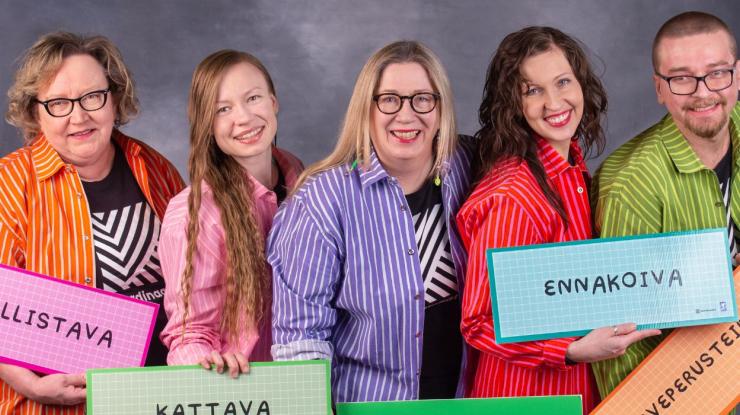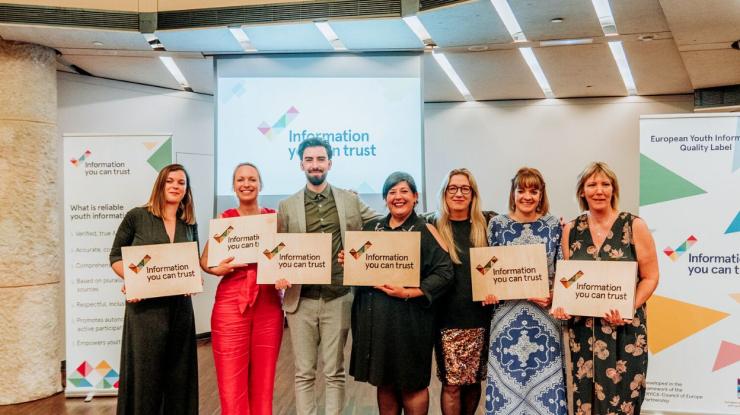Kategoria
Article
Kuvaus
Europe's greatest assets today and for the future are the human and social capital of its citizens. To manage this asset wisely it is important to constantly work for engagement and equal possibilities to engage in society. Therefore, encouraging active participation of people in society is an important objective, guaranteeing that citizens are being heard and having better opportunities to be involved in making decisions on issues that affect their lives and future.

Body
As young people are especially at risk of feeling excluded from social and civic life, and finding it challenging to understand the information provided through a wide variety of media, we will here present an Erasmus+ project, DesYIgn, with the aim to rethink how services are designed and to create tools and resources to allow youth workers and youth information workers to reach out to a maximum number of young people, especially those at risk of social exclusion. The project focuses young people up to 30 years old, which means the project results are valid for adults or any group of citizens (e.g. unemployed, refugees), that need counselling in relation to e.g. finding work, educational possibilities, or other opportunities in life. The project objective, that is to develop counselling services, is relevant for all age groups and part of lifelong learning.
Re-think services according to the needs of the user
1. The first priority of the DesYIgn project is to promote quality youth work, by supporting youth information (YI) structures in optimising youth information services and establishing efficient strategies and tools to reach out to more young people, especially those that need it the most. Focus group interviews with young people are first conducted in order to learn how young people prefer to interact with information, what are the challenges in accessing or finding information, and what kind of support would young people like to have in order to navigate the information landscape. After that, the service design thinking method will be used, with the purpose to conceive or re-think services according to the needs of the user, so that it is user-friendly, needs-based, competitive and relevant to the target group. The toolkit on innovative youth information service design will include quality measures and indicators and will be based on a methodology widely tested in other fields. The project is centred around the newly adopted European Youth Information Charter (link is external), in particular principle 2, which ensures that youth information is accessible.
2. The second priority is promoting youth empowerment. Only when young people are aware of the opportunities available to them, they can seize them and become empowered to actively participate in society. By ensuring that they obtain the information necessary for accessing their rights and opportunities available to them, youth information services ensure their involvement in society and foster their autonomy.
3. The third priority is open education and innovative practices in the digital era. The ways of reaching out to young people are constantly changing, as a result of new and emerging digital tools. In order to ensure that youth information providers are equipped with the tools and skills needed to succeed in supporting as many young people as possible, the project will develop innovative digital resources connected with current youth trends and needs. An online training course on innovative YI service design will be developed and ensures the open education for youth (information) workers and their deeper adaptation to the digital era.
Expected results and impact
The project will use desk research to ensure that the project results are evidence-based and reflect the needs and trends of young people.
The results of the project are:
1. To produce an online course on how to innovate youth information provision through service design thinking (using webinars, contributions from service design experts, videos and other digital tools) The online course will be easy to adapt and modified to fit information and guidance services for all ages.
2. To create a toolkit on service design for youth information provision aiming at reaching out to more young people, including quality indicators and measures. The toolkit can be used also in developing information provision to other groups in society, such as unemployed, migrants or other groups that need more support in finding information for their particular information needs in relation to work, education, housing, or other areas of everyday life.
3. To carry out innovative design pilots that will test the resources developed at different stages and help re-think youth information provision using service design methods, which can be used as a good practice examples not only for youth information services across Europe but also for the benefit for all ages information and guidance services.
This project explores new avenues for youth work, through its use of evidence-based research, and through its exploration of innovative methodologies for service conception. The toolkit and training course will also be suitable more generally, for any service that wish to increase its outreach and user-centered approach, by applying service design methodologies. The participation of the target group of the services, throughout every stage of the project, will ensure a user-centered approach, as the participants will be actively involved and empowered to help re-design services targeted to them. Involving them in the creation and piloting of the services is crucial for the efficiency and pertinence of the services. The results of this project may be widely applied also in other sectors, especially in the profit-making settings, engaging other target groups in service design, and thus contributing to a user-centered approach in lifelong learning.
Project coordination: European Youth Information and Counselling Agency (ERYICA)
Koordinaatti and Information Studies at Åbo Akademi University have central roles in the project.
Koordinaatti has expertise in coordinating youth work, digital communication and marketing and will contribute to this project by creating content to the toolkit and the online training course, and to piloting the tools. Koordinaatti will also participate in creating an innovative youth information service design strategy, and to project dissemination and implementation in Finland.
Information Studies at Åbo Akademi University has expertise in information behaviour research and will contribute to this project with scientific insights on youth information needs and use. They will also lead the work on the focus group interviews with young people, collecting data on information source preferences, information evaluation, and use of youth information services.
Gunilla Widén, Professor of Information Studies, Åbo Akademi University. Her field of expertise is information sciences and information behaviour. She has led several research projects on information culture, the meaning of social capital in knowledge management and information literacy in various contexts, especially youth information behaviour.
Jaana Fedotoff, Development Manager of Koordinaatti, National Centre of Expertise for Youth Information and Counselling (suomeksi Koordinaatti- Nuorten tieto- ja neuvontatyön osaamiskeskus). Very early on her work started to evolve around communication as well as youth information, counselling and guidance at national and European level. That is the path she has been following ever since and is a member in many expert groups in Finland. She has been the president of European Youth Information and Counselling Agency ERYICA since April 2016.
This article is a part of a series of articles about guidance in Finland. The series of articles is published by Euroguidance and EPALE teams at the Finnish National Agency for Education. The articles are published throughout Finland’s EU Presidency, approximately one article per month.





